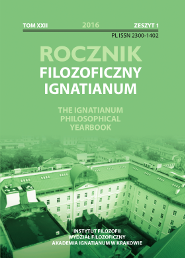Celowość w ujęciu M.A. Krąpca, S. Mazierskiego i A. Maryniarczyka
Purposefulness as construed by M.A. Krąpiec, S. Mazierski and A. Maryniarczyk
Author(s): Krzysztof KrukSubject(s): Philosophy, History of Philosophy, Epistemology, Ancient Philosphy
Published by: Uniwersytet Ignatianum w Krakowie
Keywords: purposefulness; purpose; motion; change; entity; metaphysics; action; good; cause; necessity; God
Summary/Abstract: One position on the interpretation of purposefulness adopted by Neo-Thomists (in this case Czesław Biedulski) says that the principle of purposefulness has universal significance, because it concerns every entity that can be defined by the term “action”: i.e. every entity which exists and can only be known through some form of action (in accordance with its nature). Entities work to preserve their existence, and their pursuit of survival seems to be the purpose of their actions. So, if entities are already working, then they must also be working purposefully. We can encounter philosophers who hold that every action is purposeful in the representatives of the Lublin School, such as M.A. Krąpiec OP, A. Maryniarczyk, S. Mazierski. All three of these have based their views about purposefulness on Aristotle’s teleological considerations. The present article will examine how the views of the abovementioned scholars on teleology, based on Aristotle’s philosophy of purposefulness from 2000 years ago, explain reality.
Journal: Rocznik Filozoficzny Ignatianum
- Issue Year: 22/2016
- Issue No: 1
- Page Range: 270-289
- Page Count: 20
- Language: Polish

